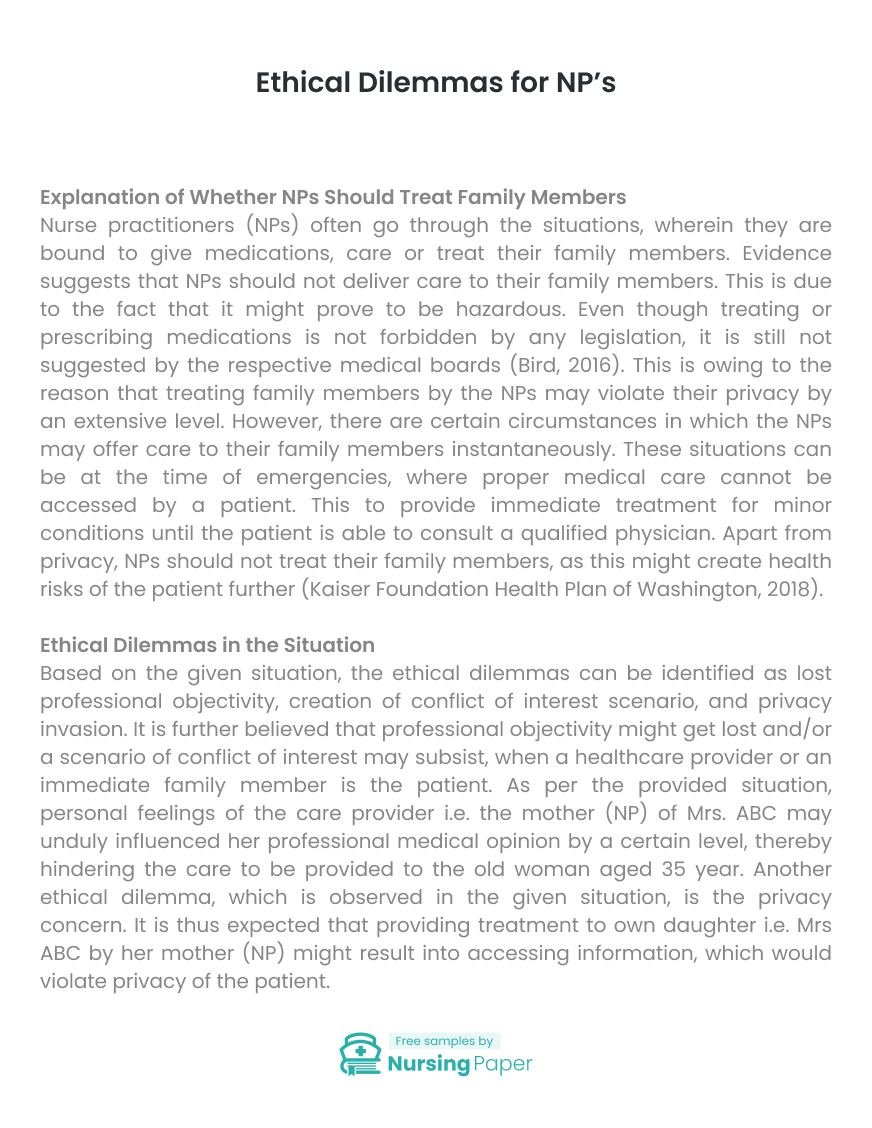
Ethical Dilemmas for NP’s
Explanation of Whether NPs Should Treat Family Members
Nurse practitioners (NPs) often go through the situations, wherein they are bound to give medications, care or treat their family members. Evidence suggests that NPs should not deliver care to their family members. This is due to the fact that it might prove to be hazardous. Even though treating or prescribing medications is not forbidden by any legislation, it is still not suggested by the respective medical boards (Bird, 2016). This is owing to the reason that treating family members by the NPs may violate their privacy by an extensive level. However, there are certain circumstances in which the NPs may offer care to their family members instantaneously. These situations can be at the time of emergencies, where proper medical care cannot be accessed by a patient. This to provide immediate treatment for minor conditions until the patient is able to consult a qualified physician. Apart from privacy, NPs should not treat their family members, as this might create health risks of the patient further (Kaiser Foundation Health Plan of Washington, 2018).
Ethical Dilemmas in the Situation
Based on the given situation, the ethical dilemmas can be identified as lost professional objectivity, creation of conflict of interest scenario, and privacy invasion. It is further believed that professional objectivity might get lost and/or a scenario of conflict of interest may subsist, when a healthcare provider or an immediate family member is the patient. As per the provided situation, personal feelings of the care provider i.e. the mother (NP) of Mrs. ABC may unduly influenced her professional medical opinion by a certain level, thereby hindering the care to be provided to the old woman aged 35 year. Another ethical dilemma, which is observed in the given situation, is the privacy concern. It is thus expected that providing treatment to own daughter i.e. Mrs ABC by her mother (NP) might result into accessing information, which would violate privacy of the patient. As per the given situation, Mrs. ABC has a sore throat and she thinks that it is a strep. She called her physician for an appointment, however he/she was available. Therefore, based on this situation, it can be stated that there does not lay any ethical dilemma because immediate care was required to be provided for the minor condition that she experienced. This can be considered to be ethical until the appointment with the qualified physician is fixed.


Laws in California for the NPs Treating Themselves, Families or Friends
As mentioned earlier, there is no such law, which excludes a nurse practitioner from diagnosing, treating, or prescribing medications to themselves, their families or friends. To be precise, this particular practice is not encouraged by the medical board in California. Nevertheless, there are certain laws in the state of California for the NPs that need to be considered while treating family members or friends. One of these laws fundamentally includes delivering care for themselves, families or friends with conducting a suitable physical examination of the individual patient prior to providing any care or prescribing medications. Moreover, another law suggests that the NPs should obtain precise medical record based on service provisions of the patients prior to treating their families or friends. The legal guidelines, as per California’s medical board, also reflect that filing a medical requirement for prescription is ought to be generated and preserved by the NPs while delivering care either to their family members or friends (State of California, 2018).
1. Bird, S. (2016). The pitfalls of prescribing for family and friends. Australian Prescriber, 39(1), 11-13.
2. Kaiser Foundation Health Plan of Washington. (2018). Self-treatment or treatment of immediate family members. Retrieved from https://provider.ghc.org/open/render.jhtml?item=/open/workingWithGroupHealth/treatment.xml
3. State of California. (2018). Frequently asked questions – general office practices/protocols. Retrieved from http://www.mbc.ca.gov/Consumers/Complaints/Complaints_FAQ/Practices_and_Protocols_FAQ.aspx



The download will start shortly.

The download will start shortly.
 Subject:
Health and Social Care
Subject:
Health and Social Care  Number of pages: 4
Number of pages: 4  Subject:
Health and Social Care
Subject:
Health and Social Care  Number of pages: 2
Number of pages: 2  Subject:
Health and Social Care
Subject:
Health and Social Care  Number of pages: 2
Number of pages: 2  Subject:
Nursing
Subject:
Nursing  Number of pages: 3
Number of pages: 3  Subject:
Medicine
Subject:
Medicine  Number of pages: 7
Number of pages: 7  Subject:
Nursing
Subject:
Nursing  Number of pages: 13
Number of pages: 13  Subject:
Health and Social Care
Subject:
Health and Social Care  Number of pages: 9
Number of pages: 9  Subject:
Medicine
Subject:
Medicine  Number of pages: 5
Number of pages: 5  Subject:
Health and Social Care
Subject:
Health and Social Care  Number of pages: 3
Number of pages: 3  Subject:
Nursing
Subject:
Nursing  Number of pages: 5
Number of pages: 5  Subject:
Health and Social Care
Subject:
Health and Social Care  Number of pages: 5
Number of pages: 5  Subject:
Nursing
Subject:
Nursing  Number of pages: 6
Number of pages: 6  Subject:
Nursing
Subject:
Nursing  Number of pages: 2
Number of pages: 2  Subject:
Nursing
Subject:
Nursing  Number of pages: 11
Number of pages: 11  Subject:
Medicine
Subject:
Medicine  Number of pages: 10
Number of pages: 10 
